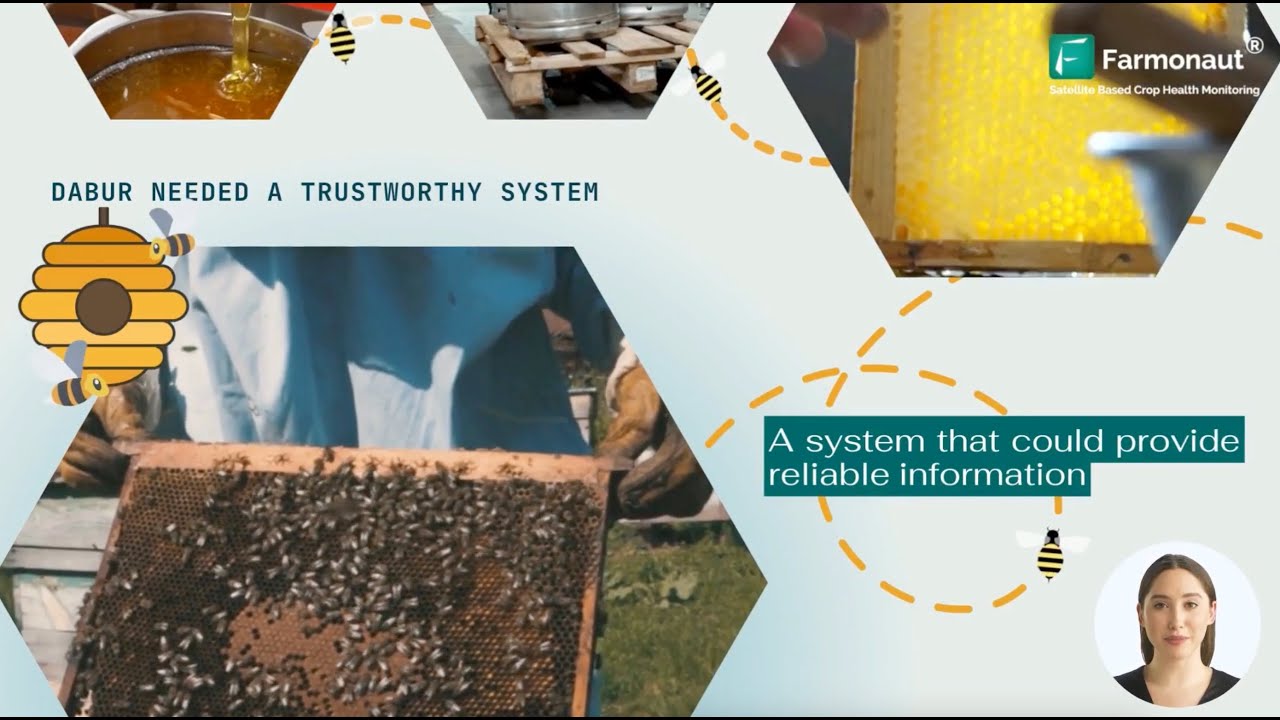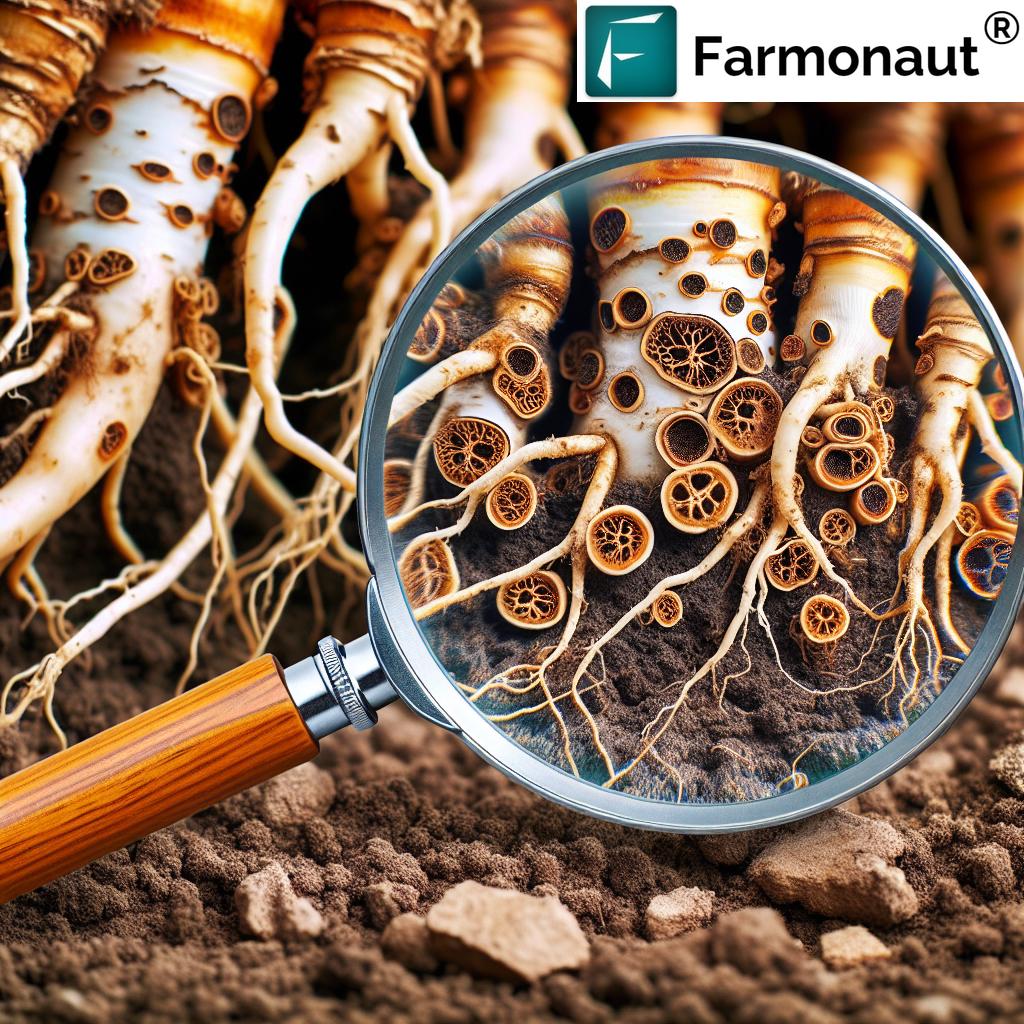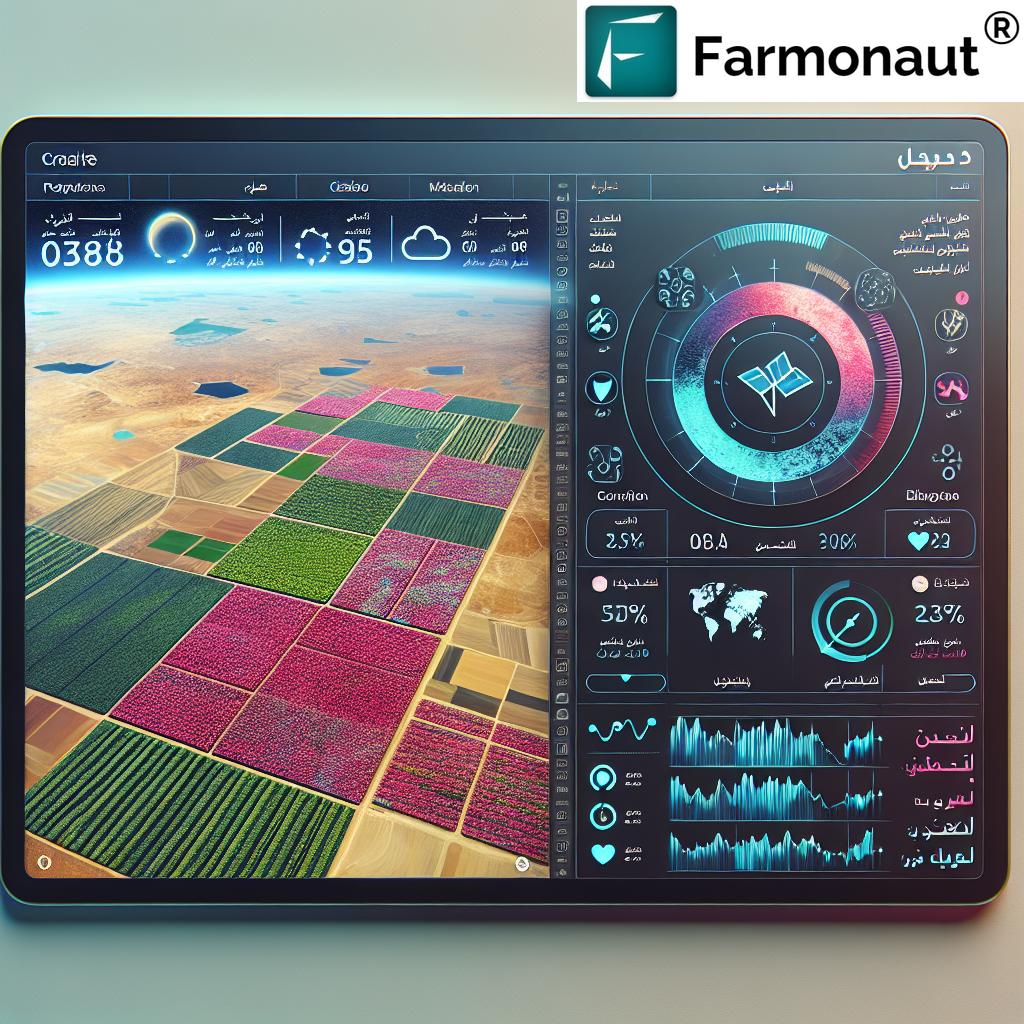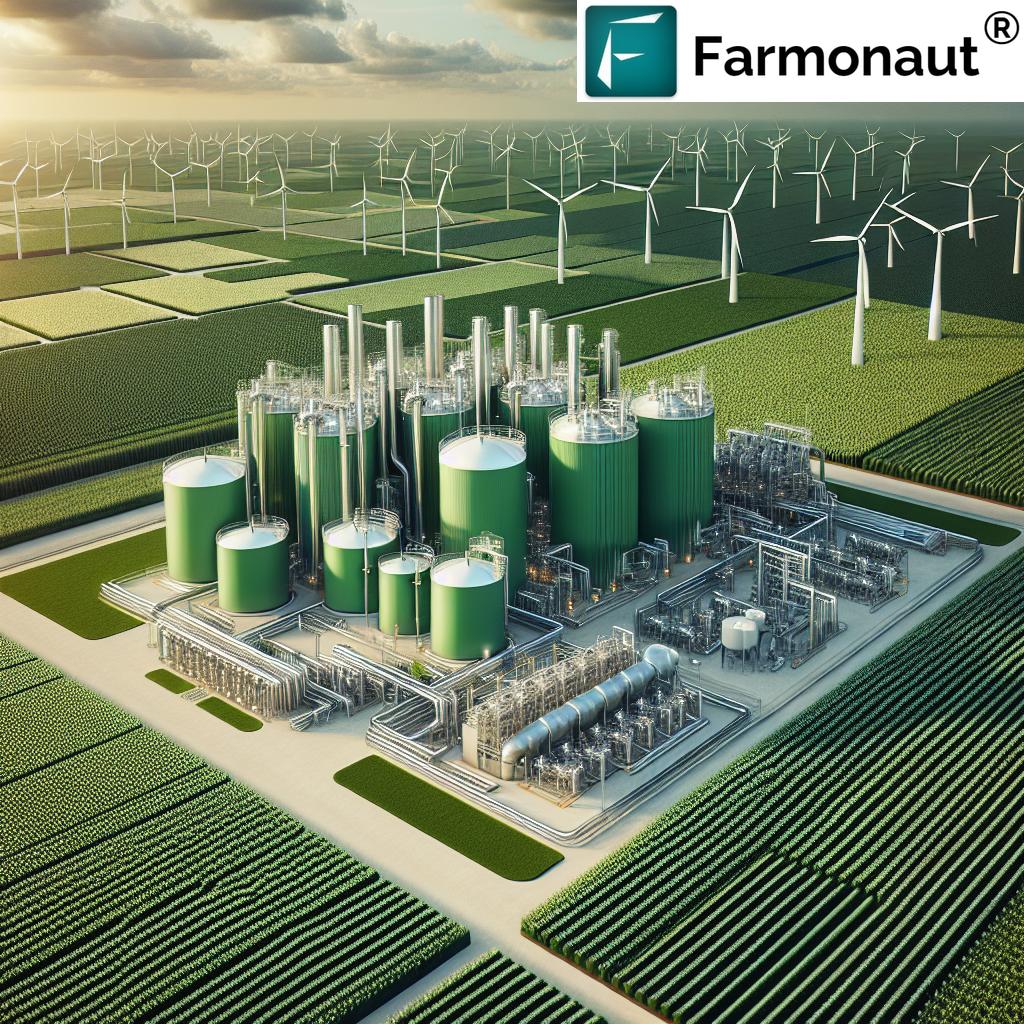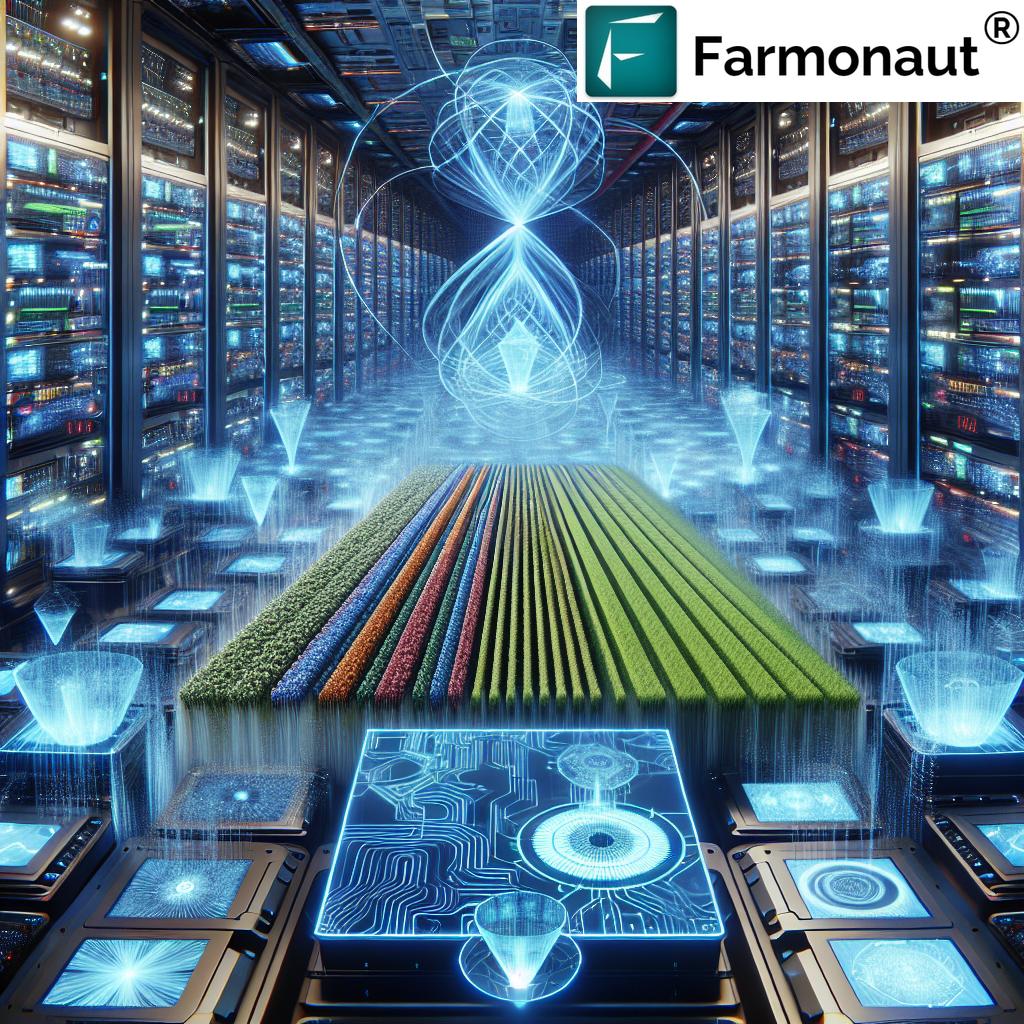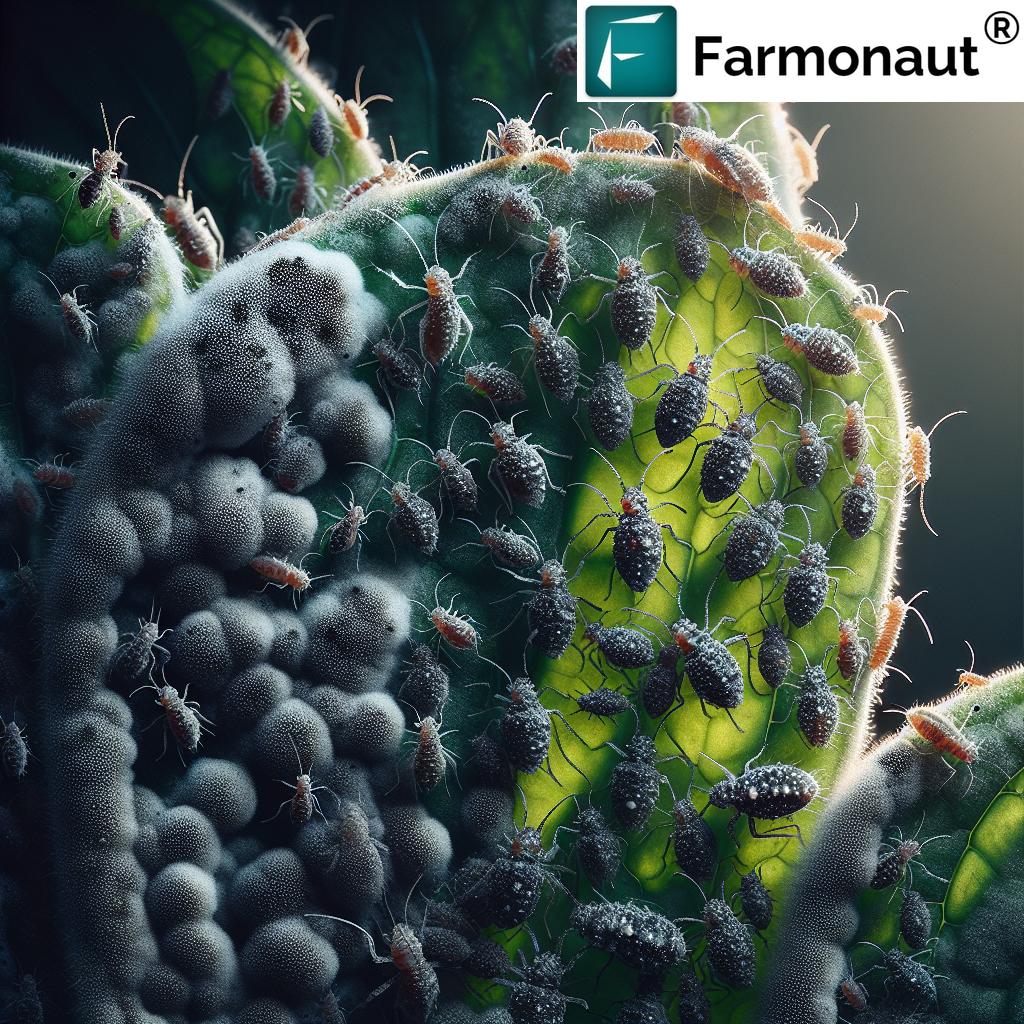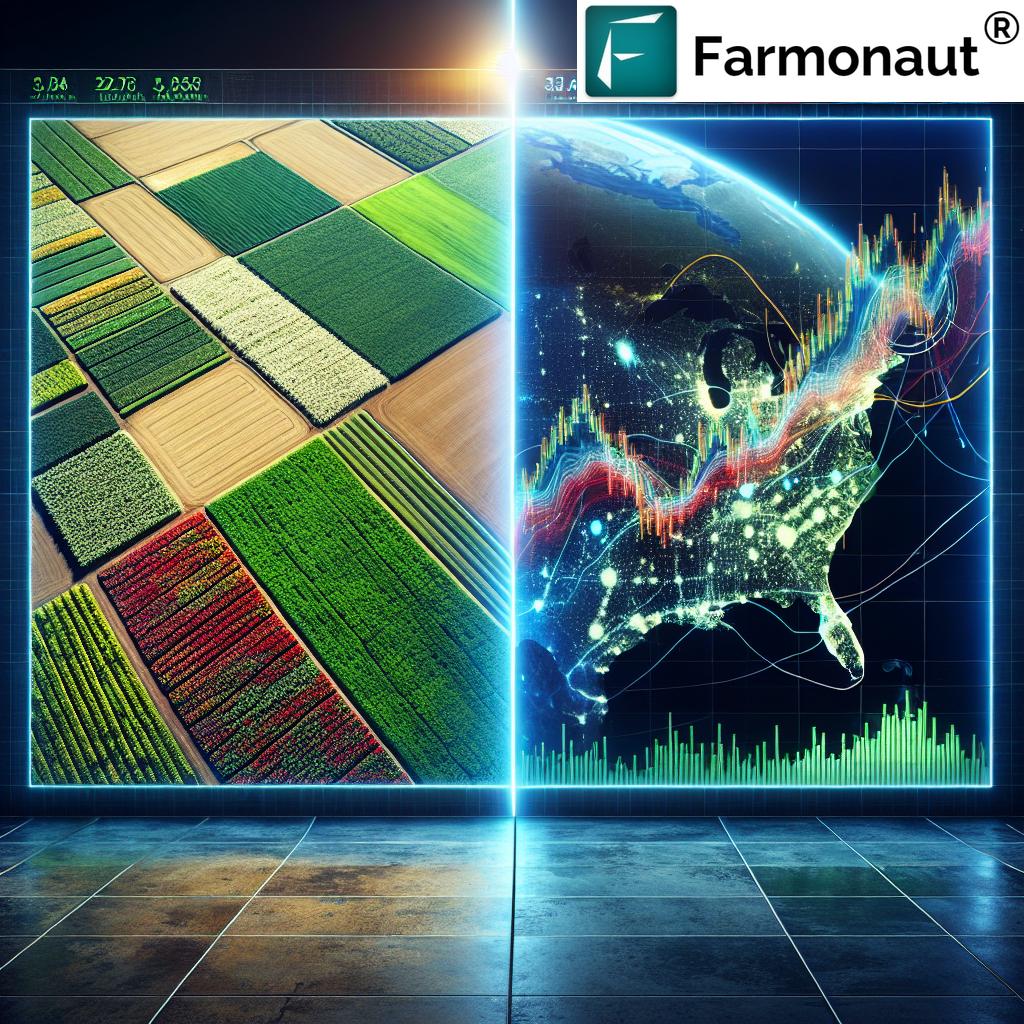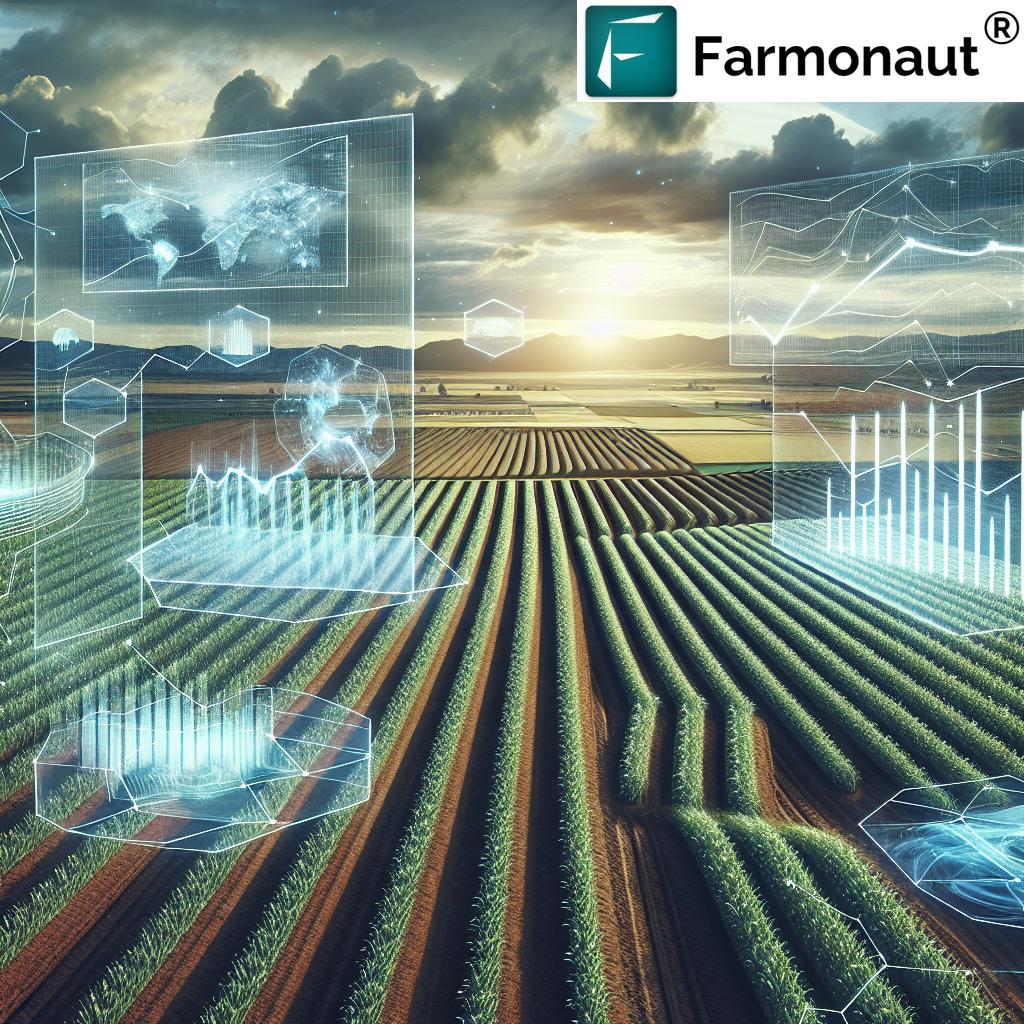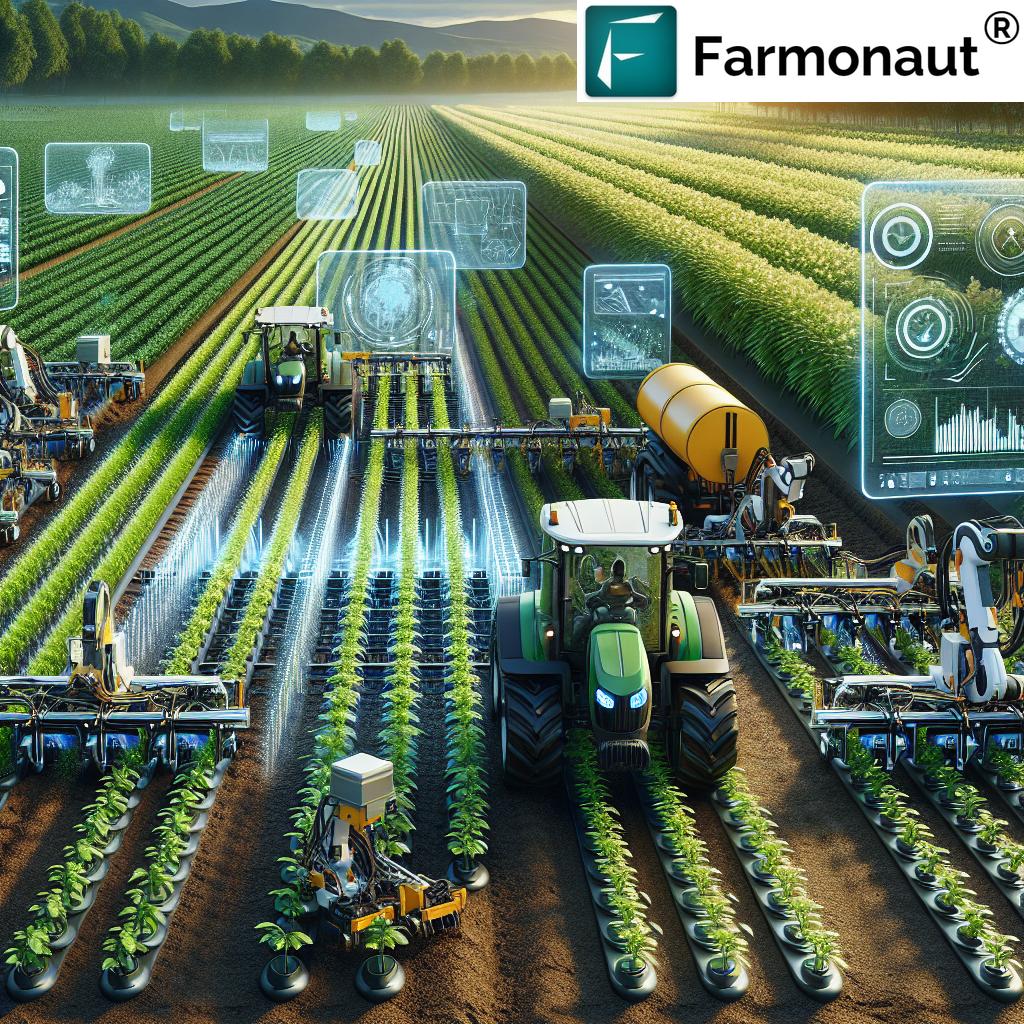Unlock 7 Precision Grow Blockchain Farming Secrets!
“Blockchain can increase agricultural traceability by up to 90%, ensuring safer food from farm to table.”
Introduction: The Blockchain Revolution in Agriculture
Over the past decade, the agricultural sector has undergone an extraordinary transformation—fueled by radical advances in technology. Among these, blockchain has emerged as a game-changer for farming practices, especially in the realm of traceability and food safety. As consumers, we increasingly demand transparency and assurance that the food we eat is safe, fresh, sustainably sourced, and ethically grown. This is where blockchain in agriculture truly shines—empowering farmers and organizations to securely document every step of a product’s journey across a decentralized, tamper-proof ledger.
With the global food supply chain growing more complex, the need for secure agricultural data management, risk mitigation, and blockchain transparency in agriculture has never been more critical. Whether you are a smallholder, a large-scale agribusiness, a food retailer, or a concerned consumer, understanding and leveraging the secrets of precision grow blockchain farming will change the way we view farming and food safety blockchain initiatives forever.
Understanding Blockchain in Agriculture
To truly unlock the secrets of blockchain in agriculture, we must first demystify what the technology actually is and why it’s so transformative for food and agricultural supply chain traceability.
What is Blockchain?
At its core, blockchain is a decentralized and immutable ledger system that enables the secure recording of transactions across a network of computers. Think of it as a digital record book—one that isn’t controlled by a single party or vulnerable to tampering. Every transaction or movement in a supply chain is documented, timestamped, and permanently recorded for full transparency and auditability.
Why Blockchain for Agriculture?
- The agricultural sector is plagued with challenges—food fraud, counterfeiting, supply chain breaks, information silos, and difficulties in tracing product origin during emergencies.
- Blockchain overcomes these by creating a shared digital ledger for stakeholders—farmers, suppliers, processors, retailers, and consumers—to access and verify every step of the product’s journey, from seed planting to harvest, processing, distribution, and final sale.
- Every item’s application, history, movement, and identification is securely documented on an immutable blockchain record.
“Over 7 precision farming secrets are unlocked with blockchain, boosting data security and transparency in agriculture supply chains.”
How Blockchain Technology in Farming Works
Let’s dig a bit deeper into the mechanics of blockchain technology in farming and its integration into the agricultural supply chain:
- Decentralization: No single authority owns or can alter the ledger. This network model prevents manipulation, fraud, and unauthorized changes.
- Tamper-Proof Structure: Each new transaction is cryptographically linked to the previous one. Once a record is added, it cannot be changed or removed.
- Transparency and Auditability: All participants can view the entire product’s journey with a simple check—boosting trust and efficiency in management.
- Smart Contracts Automation: Blockchain platforms support automated processes (e.g., payments, compliance checks) via “smart contracts.”
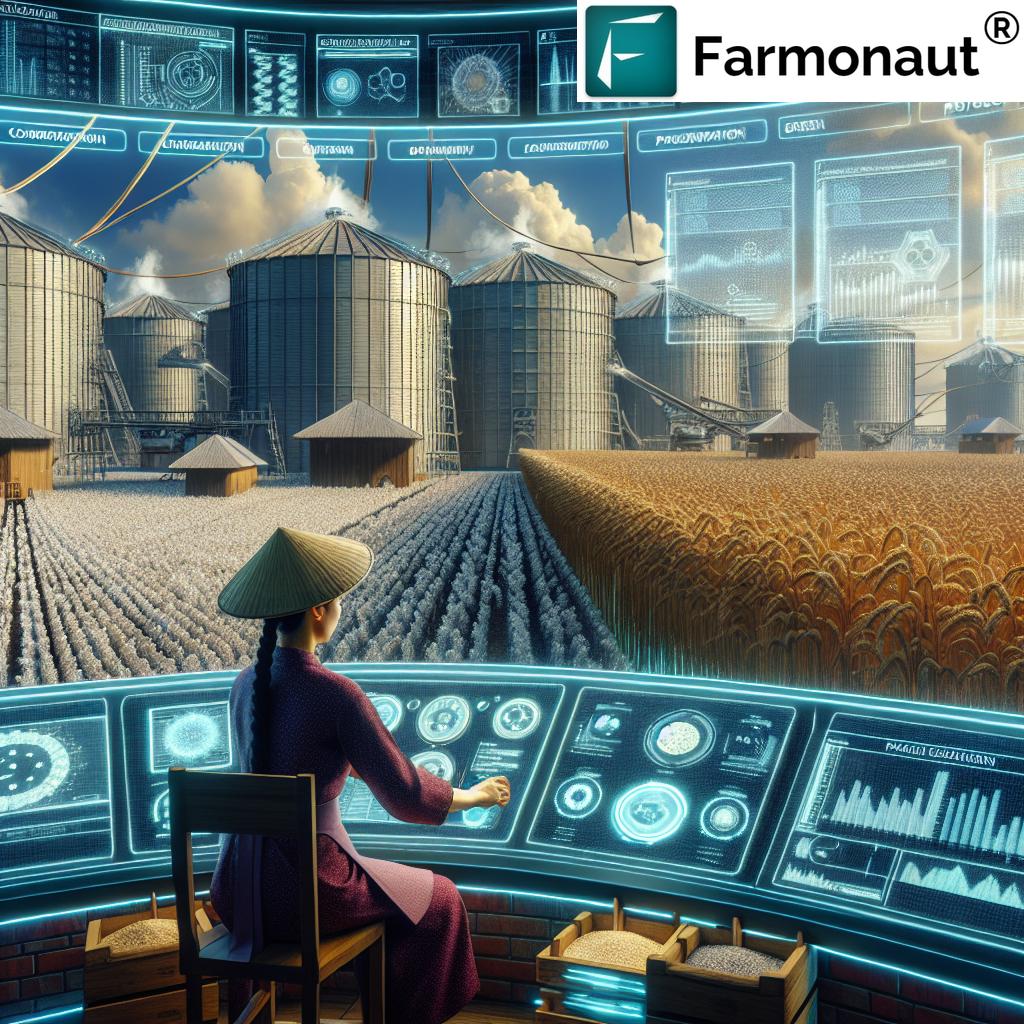
Real-World Example: Tracking a Mango’s Journey
Picture this: A mango harvested in Andhra Pradesh. The blockchain ledger records orchard details, fertilizer and pesticide usage, inspection data, packing info, every transshipment checkpoint, all the way up to supermarket shelves in Mumbai. If a single batch is later discovered to carry contaminants, we can rapidly trace all affected mangoes within seconds—a process that traditionally took days, minimizing consumer risk and economic loss.
By integrating blockchain, we are ensuring food safety, increasing transparency in every transaction, and providing farmers with stronger market opportunities.
The 7 Precision Grow Blockchain Farming Secrets
Unlocking the potential of blockchain in agriculture is about more than transparency—it’s a revolution in management, documentation, and stakeholder trust. Let’s dive into the seven game-changing secrets:
1. Unmatched Agricultural Supply Chain Traceability
Traceability is the ability to track the location, history, application, and movement of an item. When we track agricultural products with blockchain, every element—crop origin, farm inputs (like fertilizers and pesticides), handling practices, temperature logs, transit stops—is securely recorded and documented in the blockchain. The result: Food safety blockchain protocols are enforced end-to-end, and recalls or contamination events become far easier to manage.
Example: A supermarket can verify that the organic cherry tomatoes on its shelves have not only been grown chemical-free, but every handling practice and batch test has been recorded for auditability—boosting consumer confidence.
2. Radically Enhanced Food Safety and Recall Speed
- Blockchain-enabled traceability drastically improves our ability to quickly identify and remove contaminated products. For example, an event like an outbreak of foodborne illness can now be addressed by rapidly tracing the affected batch back to the farm, via every documented transaction.
- Walmart famously reduced the time to trace contaminated mangoes from a week to mere seconds using blockchain-based tracking.
In an era when food safety is paramount, the ability to rapidly recall only affected items reduces waste, reputational damage, and protects both consumers and farmers.
3. Fighting Counterfeit Products and Supply Chain Fraud
- Counterfeit agricultural products cause billions in damage worldwide, endanger consumer health, and undermine trust in the industry.
- Blockchain’s immutable ledger ensures product authenticity with verifiable, tamper-proof records.
- Whether it’s organic grains, premium wine, or pesticide-free produce, proving origin and journey with blockchain eliminates fraudulent substitutions.
4. Blockchain Transparency for All Stakeholders
Transparency isn’t only about data visibility. By making a shared ledger accessible to all, platforms ensure information is never siloed. Farmers, distributors, retailers, and consumers access the same real-time data about a product’s origin, quality, and handling. This not only fosters trust but streamlines compliance, audits, and negotiations across the agricultural value chain.
5. Direct Market Access and Fair Compensation for Farmers
- Decentralized platforms built on blockchain empower farmers to directly interact with buyers, reducing middlemen and increasing their share of profits.
- Transparent access to product data helps farmers negotiate better prices and gain market recognition for sustainable or premium practices—blockchain empowering farmers worldwide.
6. Secure Data Management for Compliance and Sustainability
- Our industry faces ever-increasing regulatory and sustainability requirements, such as carbon reporting, subsidies, and crop certifications.
- Blockchain systems handle secure agricultural data management—from carbon emission data, water usage, to compliance checks—giving stakeholders proof for every claim.
- This level of verifiable documentation is critical for government programs, international exports, and informed sustainability initiatives.
Discover Farmonaut’s Carbon Footprinting tools—empowering better, compliant farming with real-time emissions tracking.
7. Seamless Integration with AI, Analytics & Decision-Making Tools
- Blockchain traceability isn’t just about recording history—it unlocks new possibilities when combined with AI and advanced analytics.
- AI-powered advisory systems can now analyze securely documented blockchain data to predict crop yields, optimize inputs, forecast risks, and automate smarter logistics management.
Unlock farm-to-table transparency, precision yield predictions, and supply chain optimization with Farmonaut’s advanced Jeevn AI Advisory System—built right into our intuitive platform.
Farmonaut: Blockchain Empowering Farmers and Agribusinesses
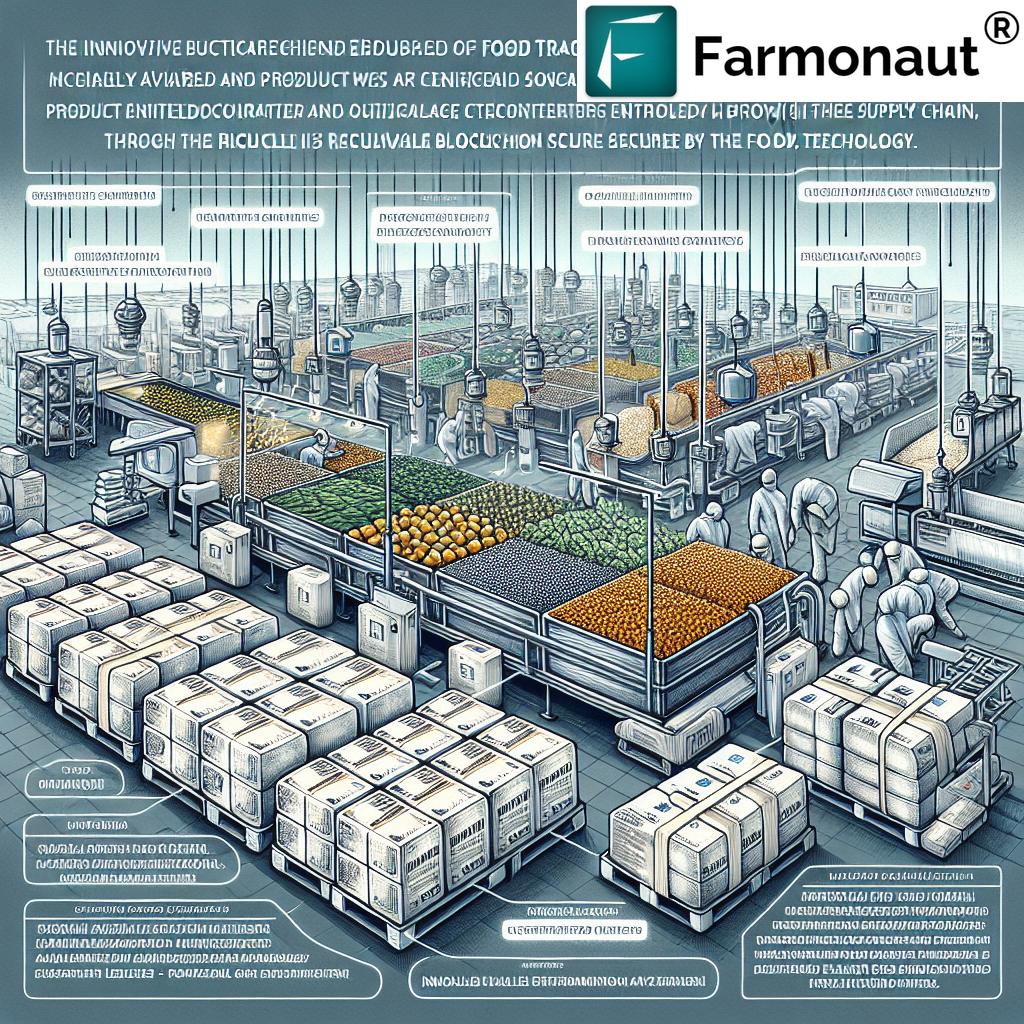
At Farmonaut, we lead with a bold vision: democratize precision agriculture and make revolutionary blockchain food traceability accessible and affordable for all. Here’s how we stand at the forefront:
- Satellite-Powered Crop Health Monitoring: Multispectral satellite imagery delivers insights on vegetation, soil moisture, pest hotspots, and more—giving farmers a real-time advantage in managing their fields.
- Jeevn AI Advisory System: Personalized, AI-driven crop management and weather predictions result in improved yields and smarter decisions.
- Blockchain-Based Product Traceability: Our traceability solutions enable farm to table blockchain solutions—tracking products from seed to shelf for maximum consumer trust.
- Resource & Fleet Management: Optimize logistics and operations with smart fleet management—increase safety, cut costs, and keep your machinery in top shape.
- Carbon & Sustainability Tracking: Our carbon footprinting modules support full environmental compliance and promote responsible farming.
Explore Farmonaut through our powerful, intuitive web and mobile apps:
Are you building your own agri-tech product? Integrate satellite, weather, and traceability data directly into your systems via the powerful Farmonaut API and API Developer Docs for streamlined development.
Blockchain Benefits in Agriculture: Key Features & Impact Areas
| Blockchain Feature | Definition | Estimated Impact | Example Use Case |
|---|---|---|---|
| Traceability | The ability to track each product’s journey, application, and origin across the entire supply chain. | Up to 90% fewer fraudulent products; 80% faster recalls | Rapidly tracing the source of food contamination or recalls via blockchain documentation |
| Data Security | Protects transaction and production data with tamper-proof cryptographic records. | 90% reduction in unauthorized data access | Documenting crop health and farm inspections securely for audits and loans |
| Transparency | Open access to every transaction in the product’s journey for all stakeholders. | 75% greater stakeholder trust; 60% lower dispute rates | Providing real-time origin and quality data to retailers and consumers |
| Transaction Speed | Automated transaction execution and validation on a decentralized ledger. | Transactions completed in seconds rather than days | Immediate grain payments upon delivery, verified on blockchain |
| Smart Contracts Automation | Enables programmable rules for instant compliance and direct payments. | 90% reduction in manual workflow errors | Auto-payment for crops delivered, after inspection data is validated |
| Cost Reduction | Lowered operational, regulatory, and audit costs through automation and shared ledgers. | 30% reduction in operational costs | Digitizing documentation and audit for organic certifications on blockchain |
| Compliance Boost | Real-time proof for certifications, export regs, and subsidies. | 50% faster government compliance reporting | Farmers instantly share compliance documentation with authorities |
Challenges and Adoption Barriers in Blockchain Agricultural Traceability
While blockchain paves the way for a brighter, fairer agricultural sector, it’s important that we acknowledge—and address—the real challenges in large-scale adoption and implementation of blockchain food traceability.
- High Implementation Costs: Smallholders often lack the resources for advanced technologies. However, affordable, subscription-based options such as Farmonaut are reducing this barrier by making blockchain-powered precision farming accessible.
- Technological Complexity: Integrating blockchain into diverse existing systems can be daunting, especially if technical expertise is limited. User-friendly platforms and large-scale farm management apps play a crucial role in broadening adoption.
- Interoperability Issues: Many agricultural supply chains utilize different legacy systems. Open APIs, such as Farmonaut’s API, support seamless integration.
- Data Privacy and Security Concerns: While transparency is vital, some farmers may be wary of sharing sensitive or proprietary information. Platforms must offer tiered data permissions, robust encryption, and security best practices to safeguard user data.
- Regulatory Hurdles: Evolving international and domestic regulations can delay or complicate blockchain implementation. Clear guidance and compliance-ready features, such as real-time reporting and documentation sharing, are essential.
At Farmonaut, all these challenges are addressed through simple interfaces, affordable subscriptions, modular features, and robust secure data management—all tailored for today’s and tomorrow’s farmers and agribusinesses.
The Future of Blockchain in Agriculture and Supply Chain Traceability
The journey of blockchain in agriculture has only just begun. As technology evolves, so does our opportunity to make farming not only more efficient, but also more transparent, ethical, and sustainable. Here’s where the world is heading:
- AI + Blockchain: Combining real-time blockchain data streams with artificial intelligence (AI) and machine learning (ML) unlocks predictive analytics for yield, pest risk, logistics, and climate adaptation.
- Sustainability and Compliance: Blockchain allows for immutable, auditable environmental records—vital for cutting emissions, documenting fair labor, and achieving certifications.
- Global Interoperability: Open APIs and standardized smart contracts will make supply chain integration borderless, supporting global trade.
- Empowered Consumers: Imagine scanning a QR code on your mango or textile and instantly accessing the full verified history and certifications—right on your phone!
As consumers, farmers, regulators, and companies all demand transparency and security, blockchain technology is set to become the backbone of our agricultural future.
Ready to empower your farm? Get actionable insights, document every transaction, and boost compliance—all in one place, thanks to Farmonaut’s integrated platform.
Farmonaut Subscription Plans
We offer flexible, scalable subscription models tailored for individual farmers, cooperatives, agribusinesses, and government users. Choose the monitoring frequency, number of hectares, and advanced features that suit your needs—all for a fraction of the cost of traditional precision agriculture tools.
Start today with our browser, Android, or iOS apps, or read more about our solutions for crop plantation and forest advisory.
Frequently Asked Questions (FAQ)
What is blockchain in agriculture, and how does it work?
Blockchain in agriculture refers to the use of a decentralized, tamper-proof ledger to record every key transaction and movement in the agricultural supply chain. Every event—from seed planting to harvest, processing, inspection, and distribution—is securely documented, allowing for transparent, auditable, and immutable records that all stakeholders can trust.
How does blockchain improve food safety and recall management?
Blockchain enables rapid tracking and identification of affected batches during contamination or foodborne illness outbreaks. By providing real-time, verifiable history of each product’s journey and handling practices, recalls can be targeted and executed in seconds, minimizing health risks and losses.
What are the main benefits of blockchain transparency in agriculture?
Key benefits include traceability, data security, transparency, faster transactions, reduced fraud, improved trust, cost savings, and seamless compliance with regulations. Farmers, processors, retailers, and consumers all benefit from having access to reliable, real-time supply chain information.
What makes Farmonaut unique in blockchain agri-tech solutions?
Farmonaut leverages satellite imagery, AI, and blockchain to provide affordable, scalable real-time data and traceability for farms of any size. Unlike hardware-heavy precision farming tools, Farmonaut is easy to adopt, integrates seamlessly, and ensures secure, actionable insights—all accessible through mobile and web apps, or via simple API integration.
Is blockchain technology affordable and scalable for small farmers?
Yes! Platforms like Farmonaut offer subscription-based models and mobile-first solutions, making advanced blockchain traceability and farm management accessible for even the smallest rural producers, as well as global agribusinesses.
How do I get started with Farmonaut’s blockchain-based solutions?
Download our app from the Google Play Store or App Store, or use our web platform to get started with crop health monitoring, blockchain traceability, and more!
Conclusion: Transforming Agriculture with Blockchain-Powered Traceability
As we look toward the future of agriculture and the food industry, it’s clear that blockchain will play an integral role in building a safer, more transparent, and resilient food system. This technology’s unique ability to guarantee traceability, secure data management, product authenticity, and trust among stakeholders is revolutionizing the way we produce, manage, and consume food.
At Farmonaut, our mission is to bring this revolution to everyone—from small-scale farmers in rural villages to multinational agribusinesses. Our elegant blend of satellite intelligence, machine learning, AI-driven advisory, and blockchain-powered traceability empowers farmers, enhances productivity, improves sustainability, and nurtures consumer trust worldwide.
The era of guesswork and opaque food supply chains is ending—ushering in a bold new chapter of secure, data-driven, and transparent farming.
Get started on your blockchain journey and unlock the full potential of your land, your business, and your food—all with Farmonaut.


